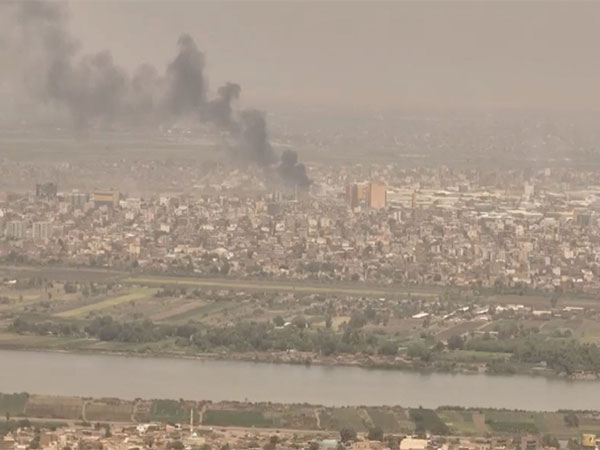Khartoum under bombardment as Sudan's rivals talk
Shelling and air strikes pounded parts of Sudan's capital on Sunday with little sign that warring military factions were ready to back down in a month-long conflict that has killed hundreds despite ceasefire talks in Saudi Arabia. Khartoum and the adjoining cities of Bahri and Omdurman across the Nile's two branches have been the main theatre of conflict along with western Darfur province since the army and the Rapid Support Forces paramilitary started fighting on April 15.

- Country:
- Sudan
Shelling and air strikes pounded parts of Sudan's capital on Sunday with little sign that warring military factions were ready to back down in a month-long conflict that has killed hundreds despite ceasefire talks in Saudi Arabia.
Khartoum and the adjoining cities of Bahri and Omdurman across the Nile's two branches have been the main theatre of conflict along with western Darfur province since the army and the Rapid Support Forces paramilitary started fighting on April 15. Shelling struck Bahri and air strikes hit Omdurman early on Sunday, according to a Reuters reporter and witnesses. "There were heavy air strikes near us in Saliha that shook the doors of the house," said Salma Yassin, a teacher in Omdurman.
A resident near Khartoum airport, which has been closed since the start of the conflict, said there had been intermittent fighting throughout the day. The unrest has killed at least 676 people and injured 5,576, the United Nations said on Sunday, though with many reports of people missing and bodies left unburied, the real toll is expected to be much higher.
About 200,000 have fled into neighbouring countries and more than 700,000 have been displaced inside Sudan, triggering a humanitarian crisis that threatens to draw in outside powers and destabilise the region. The conflict has also enveloped the economy. On Sunday army chief Abdel Fattah al-Burhan issued a decree freezing the bank accounts of the RSF and affiliated firms, and replaced the central bank governor.
Those who have remained in Khartoum have been struggling to survive as health services have collapsed, power and water supplies have been cut, and food stocks have dwindled. On Saturday night, RSF gunmen seeking money attacked a church in Omdurman, injuring five people including a priest, a Coptic Christian activist said. The army also blamed the RSF for the attack, while the RSF said in a statement that an "extremist" group affiliated with the army was responsible.
The head of a government unit for combating sexual violence said it had received five reports of rape linked to the conflict, while the Civilian Front to Stop the War, a Sudanese campaign group, said it had recorded other unverified reports of sexual violence. UNREST IN DARFUR
Fighting reportedly intensified in Geneina, capital of West Darfur. The number of people killed there on Friday and Saturday reached more than 100, including the imam of the city's old mosque, the Darfur Bar Association said in a statement. The local rights group blamed the killings, looting and arson in Geneina, where hundreds died in violence last month, on attacks by armed groups on motorbikes and the RSF. The RSF has denied responsibility for the unrest.
Army chief Burhan and RSF leader Mohamed Hamdan Dagalo, known as Hemedti, had shared power after a 2021 coup that itself followed a 2019 uprising that ousted veteran Islamist autocrat Omar al-Bashir. But they fell out over the terms and timing of a planned transition to civilian rule and neither man has shown he is ready for concessions, with the army controlling air power and the RSF dug deep into city districts.
Truce deals have been repeatedly broken but the United States and Saudi Arabia are mediating talks in Jeddah aimed at securing a lasting ceasefire. "You don't know how long this war will continue ... The house became unsafe and we don't have enough money to travel out of Khartoum. Why are we paying the price of Burhan and Hemedti's war?" said Yassin, the teacher.
On Thursday the sides agreed a "declaration of principles" to protect civilians and secure humanitarian access, but with Sunday's discussions due to address monitoring and enforcement mechanisms for that deal, the fighting has not let up. Looting and destruction from the fighting has also affected aid supplies. In the past few days a factory that provided 60% of the food used by the United Nations to treat children with severe acute malnutrition in Sudan was burned down.
The fire destroyed supplies to treat some 14,500 children as well as the factory's machinery, children's agency UNICEF said.
(This story has not been edited by Devdiscourse staff and is auto-generated from a syndicated feed.)










